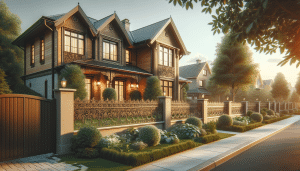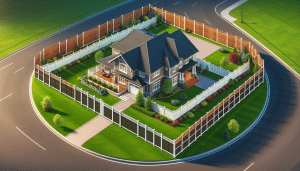Vinyl fencing has become an increasingly popular choice for homeowners looking to enhance the appearance and security of their property. This type of fencing has a long history, dating back to the 1980s when it was first introduced as an alternative to traditional wood and metal fences. Vinyl fencing is made from a durable plastic material called polyvinyl chloride (PVC), which is known for its strength and resistance to weathering.
Vinyl fencing is a type of fence made from PVC, a synthetic material that is known for its durability and low maintenance requirements. It is made by extruding PVC through a die, which creates the desired shape and size of the fence panels. The panels are then assembled using interlocking mechanisms or fasteners, creating a solid and secure fence.
Contents
- 1 Pros of Vinyl Fencing
- 2 Cons of Vinyl Fencing
- 3 Durability and Maintenance of Vinyl Fencing
- 4 Cost of Vinyl Fencing
- 5 Aesthetics and Style of Vinyl Fencing
- 6 Environmental Impact of Vinyl Fencing
- 7 Comparing Vinyl Fencing to Other Fencing Options
- 8 Considerations for Choosing a Vinyl Fence Installer
- 9 Why Choose Savannah Gate & Fence for Your Vinyl Fencing Needs
Key Takeaways
- Vinyl fencing is a popular alternative to traditional wood and metal fencing options.
- Pros of vinyl fencing include its durability, low maintenance requirements, and resistance to pests and weather damage.
- Cons of vinyl fencing include its higher upfront cost compared to some other materials and potential for fading or discoloration over time.
- Vinyl fencing is generally easy to maintain and can last for many years with proper care.
- When choosing a vinyl fence installer, it’s important to consider factors such as experience, reputation, and pricing. Savannah Gate & Fence is a trusted provider of high-quality vinyl fencing solutions.
Pros of Vinyl Fencing
One of the main advantages of vinyl fencing is its low maintenance requirements. Unlike wood or metal fences, vinyl fences do not need to be painted or stained regularly to maintain their appearance. They are also resistant to rot, rust, and insect damage, making them a long-lasting option for homeowners.
Vinyl fencing is also highly resistant to weathering. It can withstand extreme temperatures, high winds, and heavy rain without warping or deteriorating. This makes it an ideal choice for homeowners in areas with harsh climates.
In addition to its durability, vinyl fencing is also easy to clean. Unlike wood fences that require regular scrubbing and staining, vinyl fences can be cleaned with just soap and water. This makes it a convenient option for homeowners who want a low-maintenance fence that still looks great.
Another advantage of vinyl fencing is the wide variety of styles and colors available. Whether you prefer a traditional picket fence or a modern privacy fence, there is a vinyl option to suit your taste. Vinyl fences are available in a range of colors, including white, tan, and gray, allowing you to choose a color that complements your home’s exterior.
Cons of Vinyl Fencing
While vinyl fencing has many advantages, there are also some drawbacks to consider. One of the main disadvantages is the higher upfront cost compared to some other fencing options. Vinyl fencing can be more expensive than wood or chain-link fences, especially for larger properties. However, it is important to consider the long-term costs and benefits of vinyl fencing, as it requires less maintenance and has a longer lifespan than other materials.
Another potential drawback of vinyl fencing is that it can crack or fade over time. While vinyl fences are designed to be durable and resistant to weathering, they are not completely immune to damage. Extreme temperatures and UV exposure can cause the vinyl to become brittle and crack, while prolonged exposure to sunlight can cause the color to fade. However, these issues can be mitigated by choosing a high-quality vinyl fence and taking proper care of it.
Limited customization options are another potential downside of vinyl fencing. Unlike wood fences that can be easily customized with paint or stain, vinyl fences are available in a limited range of colors and styles. While there is still a wide variety to choose from, homeowners looking for a truly unique fence may prefer other materials.
Durability and Maintenance of Vinyl Fencing
Vinyl fencing is known for its durability and low maintenance requirements. The PVC material used in vinyl fences is resistant to rot, rust, and insect damage, making it a long-lasting option for homeowners. Unlike wood fences that can warp or rot over time, vinyl fences maintain their shape and appearance for many years.
To maintain a vinyl fence, regular cleaning is recommended. This can be done with just soap and water, using a soft brush or cloth to remove any dirt or debris. It is important to avoid using abrasive cleaners or scrub brushes, as these can scratch the surface of the vinyl.
In terms of durability, vinyl fencing compares favorably to other materials such as wood and metal. Wood fences require regular staining or painting to protect them from the elements, while metal fences can rust over time. Vinyl fences, on the other hand, are designed to withstand extreme temperatures, high winds, and heavy rain without warping or deteriorating.
Cost of Vinyl Fencing
The cost of vinyl fencing can vary depending on factors such as the size of the fence, the style and color chosen, and the location of the property. On average, vinyl fencing can cost between $20 and $40 per linear foot, including installation. This makes it a more expensive option compared to wood or chain-link fences.
However, it is important to consider the long-term costs and benefits of vinyl fencing. While the upfront cost may be higher, vinyl fences require less maintenance and have a longer lifespan than other materials. This can result in savings over time, as homeowners do not need to spend money on painting or staining their fence or replacing damaged panels.
To save money on vinyl fencing, homeowners can consider installing the fence themselves instead of hiring a professional. However, it is important to have the necessary skills and tools to ensure a proper installation. Another way to save money is to choose a simpler style or color of vinyl fence, as more intricate designs and custom colors can be more expensive.
Aesthetics and Style of Vinyl Fencing
Vinyl fencing offers a wide range of styles and colors to suit any home’s aesthetic. Whether you prefer a traditional picket fence or a modern privacy fence, there is a vinyl option to match your taste.
Some popular styles of vinyl fencing include:
– Picket fences: These fences feature evenly spaced vertical pickets that are attached to horizontal rails. They are available in various heights and can be customized with decorative caps or finials.
– Privacy fences: These fences provide maximum privacy by featuring solid panels without any gaps. They are available in different heights and can be customized with lattice or decorative accents.
– Ranch rail fences: These fences are a popular choice for rural properties and feature horizontal rails attached to sturdy posts. They are available in two, three, or four-rail designs.
In addition to the various styles, vinyl fencing is also available in a range of colors. While white is the most common color for vinyl fences, there are also options such as tan, gray, and even wood grain finishes. This allows homeowners to choose a color that complements their home’s exterior and landscaping.
When choosing the right style of vinyl fence for your home, it is important to consider factors such as the purpose of the fence, the level of privacy desired, and the overall aesthetic of your property. Consulting with a professional fence installer can help you make an informed decision and ensure that you choose the right fence for your needs.
Environmental Impact of Vinyl Fencing
The environmental impact of vinyl fencing is a topic of debate among homeowners and environmentalists. While vinyl fencing has some advantages in terms of durability and low maintenance, it also has some drawbacks in terms of sustainability.
One of the main concerns with vinyl fencing is its production process. PVC, the material used to make vinyl fences, is derived from fossil fuels and requires a significant amount of energy to produce. This contributes to greenhouse gas emissions and dependence on non-renewable resources.
Another concern is the disposal of vinyl fencing at the end of its life cycle. While vinyl fences can last for many years, eventually they will need to be replaced or removed. Proper disposal of vinyl fencing is important to prevent it from ending up in landfills or being incinerated, which can release harmful chemicals into the environment.
In comparison to other fencing materials, such as wood or metal, vinyl fencing has a lower environmental impact in terms of maintenance requirements. Wood fences require regular staining or painting, which can involve the use of toxic chemicals. Metal fences can rust over time, requiring maintenance and potentially releasing harmful substances into the environment.
To minimize the environmental impact of vinyl fencing, homeowners can choose a high-quality fence that is made from recycled materials. Some manufacturers offer vinyl fences that are made from a percentage of recycled PVC, reducing the need for new materials. It is also important to properly dispose of vinyl fencing at the end of its life cycle by recycling it or finding a reputable waste management company.
Comparing Vinyl Fencing to Other Fencing Options
When choosing a fence for your property, it is important to consider the pros and cons of different materials. Vinyl fencing offers several advantages over other options, but it also has some drawbacks that may make other materials more suitable for certain situations.
Wood fencing is a popular choice for its natural beauty and versatility. Wood fences can be customized with paint or stain to match any home’s aesthetic, and they are available in a wide range of styles and sizes. However, wood fences require regular maintenance to protect them from rot, insects, and weathering. They can also be more susceptible to damage from high winds or heavy rain.
Metal fencing, such as aluminum or wrought iron, is known for its strength and durability. Metal fences are resistant to rot, insects, and weathering, making them a long-lasting option. However, metal fences can be more expensive than vinyl or wood fences, and they may require regular maintenance to prevent rusting.
Chain-link fencing is a cost-effective option that provides security without obstructing views. Chain-link fences are durable and require minimal maintenance, but they may not offer the same level of privacy as other materials. They are also not as aesthetically pleasing as vinyl or wood fences.
When comparing vinyl fencing to other materials, it is important to consider factors such as durability, maintenance requirements, cost, and aesthetic appeal. Consulting with a professional fence installer can help you make an informed decision and choose the right material for your needs.
Considerations for Choosing a Vinyl Fence Installer
Choosing a reputable vinyl fence installer is an important step in ensuring a successful and long-lasting fence installation. There are several factors to consider when selecting an installer, including their experience, reputation, and customer reviews.
One of the first things to look for in a vinyl fence installer is their experience. It is important to choose an installer who has experience working with vinyl fencing specifically, as it requires different techniques and tools compared to other materials. Ask the installer how long they have been in business and how many vinyl fences they have installed.
Another important consideration is the installer’s reputation. Look for reviews or testimonials from previous customers to get an idea of their level of professionalism and quality of work. You can also ask for references and contact previous customers directly to ask about their experience with the installer.
It is also important to choose an installer who is licensed and insured. This ensures that they have met certain standards and regulations, and it protects you in case of any accidents or damages during the installation process.
Finally, consider the cost of the installation. While it is important to find an installer who offers competitive pricing, it is also important to remember that quality workmanship is worth paying for. Be wary of installers who offer significantly lower prices than their competitors, as this may indicate subpar materials or workmanship.
Why Choose Savannah Gate & Fence for Your Vinyl Fencing Needs
Savannah Gate & Fence is a local company that specializes in vinyl fencing installation in the Savannah area. With over 20 years of experience in the industry, they have built a reputation for providing high-quality workmanship and excellent customer service.
One of the benefits of choosing a local company like Savannah Gate & Fence is their knowledge of the local climate and building codes. They understand the unique challenges and requirements of installing a fence in the Savannah area, and they can provide expert advice and guidance throughout the process.
Savannah Gate & Fence offers a wide range of vinyl fencing options to suit any home’s aesthetic. Whether you prefer a traditional picket fence or a modern privacy fence, they have a style and color to match your taste. Their experienced team can help you choose the right fence for your needs and ensure a seamless installation.
In addition to vinyl fencing, Savannah Gate & Fence also offers other services such as gate installation, deck construction, and railing installation. This makes them a one-stop shop for all your outdoor improvement needs.
When it comes to vinyl fencing in the Savannah area, Savannah Gate & Fence is the best choice. With their experience, expertise, and commitment to customer satisfaction, they can help you enhance the appearance and security of your property with a high-quality vinyl fence.
If you’re considering vinyl fencing for your property, it’s important to weigh the pros and cons before making a decision. However, once you’ve installed your vinyl fence, you’ll need to know how to maintain it all year round. This article on Savannah Gate & Fence provides useful tips on how to maintain your fence throughout the seasons. From cleaning and inspecting for damage to addressing any repairs or replacements, this article covers everything you need to know to keep your vinyl fence looking its best.




